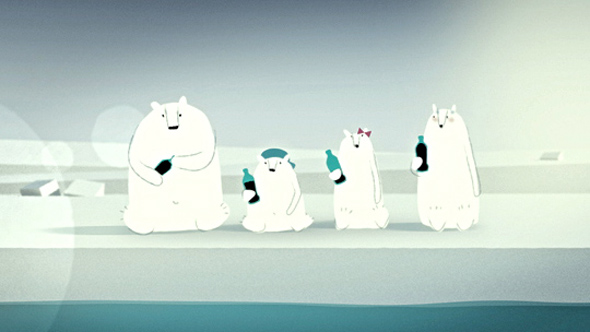Center for Communications, Health and the Environment

Soda
Wars:
Advocacy Group Shines Harsh Spotlight on Sugary Drinks
Taking on Big Soda is no small matter. Maybe that's why the Center for Science in the Public Interest (CSPI) decided to aim high and hit the industry where it hurts, using the world's best-known soda maker's own promotional materials against it in a recent sugary beverage blitz.
Escalating its long-standing campaign to reduce the consumption of soda and other sugared drinks, the D.C.-based advocacy group released an animated short film satirizing The Coca-Cola Company's use of happiness and computer-generated polar bears to sell soda - exposing the drinks' unhappy health consequences in the process.
Premiering in October 2012, CSPI's "The Real Bears" features a family of soda-guzzling polar bears that becomes progressively disease-ridden due to its beverage habit before pouring its "pop" into the sea, and reclaiming health and happiness. The video went viral, spreading rapidly on Facebook and Twitter after USA Today called it "the video that Coca-Cola does not want you to see."
 |
A family of polar bears ponders
its prodigious pop consumption in CSPI's "The Real Bears," an animated
short film satirizing The Coca-Cola Company’s use of happiness and
computer-generated bears to sell soda. |
Created by ad guru Alex Bogusky and featuring
an original song, "Sugar," by singer-songwriter Jason Mraz, the
animated short has been viewed more than 2 million times since its release.
The "Truth"...
"This project attempts to contrast the marketing hype
around soda with the stark reality, and it is my hope that it makes some
small contribution to a critical cultural awakening," commented Bogusky,
who formerly helmed advertising campaigns for Coke Zero and Burger King,
in addition to the American Legacy Foundation's "Truth" campaign, the
most successful youth-focused anti-tobacco education initiative in U.S.
history.
Filmmaker Morgan Spurlock of Super Size Me fame called "The Real Bears" "one of the most brilliant counter-campaigns ever created," while fitness expert Jillian Michaels, publisher Arianna Huffington, "Bizarre Foods" host Andrew Zimmern, consumer advocate Ralph Nader, and "TODAY" Show nutrition and health expert Joy Bauer were among the thousands of people who tweeted about the film.
"Coke and Pepsi have skillfully cultivated incredibly
strong emotional bonds with consumers around the world even though their
products actually cause quite a bit of misery," said CSPI Executive Director
Michael F. Jacobson. "'The Real Bears' seeks to get people thinking
about what they're drinking. We don't have [Coke and Pepsi's] budgets,
but we do have the truth."
...And Nothing But the "Truth"
The Coca-Cola Company begs to differ, however, vehemently
opposing "The Real Bears" as "irresponsible and grandstanding,"
and contending that the video "distorts the facts while we and our industry
partners are working with government and civil society on real solutions."
The "real truth" likely lies somewhere in between.
"['The Real Bears'] certainly makes it seem as if colas are to blame for everything from erectile dysfunction to unemployment," noted Boston Globe staff writer Deborah Kotz in October 2012 on the paper's "Daily Dose" blog. "[B]ut in creating a distortion similar to [Coke's] original teach-the-world-to-sing video...it certainly sends a powerful message," she added.
Kotz goes on to state that The Coca-Cola Company could
have clarified its argument by pointing out that the current obesity problem
and rise in diabetes wasn't caused by a single food and won't be cured
by a single solution.
Damaged Control
While Coke and CSPI duked it out in the media, consumers
were employing the tools of the trade to make their own "Pour One Out"
videos for a contest sponsored by CSPI in conjunction with "The Real
Bears." The Pour One Out Video Contest invited the public to produce
short movies demonstrating the pouring out of sugary drinks in a creative
way. Bogusky and CSPI staff judged the contest entries on creativity,
originality and effectiveness of the health message, offering a $1,000
prize for the winning film, a Nashville, Tenn., family's rap video inspired
by its stay-at-home dad's personal struggle with soda consumption, and
$500 and $250 prizes for the second- and third-place films, which were
produced by 5th-grade students in Incline Village, Nev., and an information-technology
professional from St. Metairie, La., respectively.
Not inclined to rest on its laurels, in January 2013, CSPI released a video "translation" of Coke's recent two-minute-long "Coming Together" ad addressing obesity. The widely jeered original – Adweek deemed it "awkward" and "a surprisingly ham-fisted answer to the latest attacks on the soda industry" – gave the impression that all sources of calories are equal, when in fact liquid calories are more conducive to weight gain than solid calories, according to the advocacy group. CSPI's translation also points out that, while Coke's ad congratulates the soda industry for "voluntary changes" in schools, those changes came about only after parents, school boards and state laws started pushing soda out of educational institutions.
So, the "Battle of Big Soda" continues – with the front line switching to places like New York City, where a charge to ban the sale of large sugary drinks in city-regulated venues is being led by "General" Mayor Michael Bloomberg and his troops at the New York City Department of Health.
Read More:
Lead
Article: How
Sweet It Isn't: High Sugar Intake Threatens Human Health Worldwide
CECHE News: A
Man for All Freedoms: Mark Palmer Leaves Legacy of Liberty and Change

Dr. Sushma Palmer, Program Director
Valeska Stupak, Writer, Editor & Design Consultant
Shiraz Mahyera, Systems Manager
Rohit Tote, Website Consultant